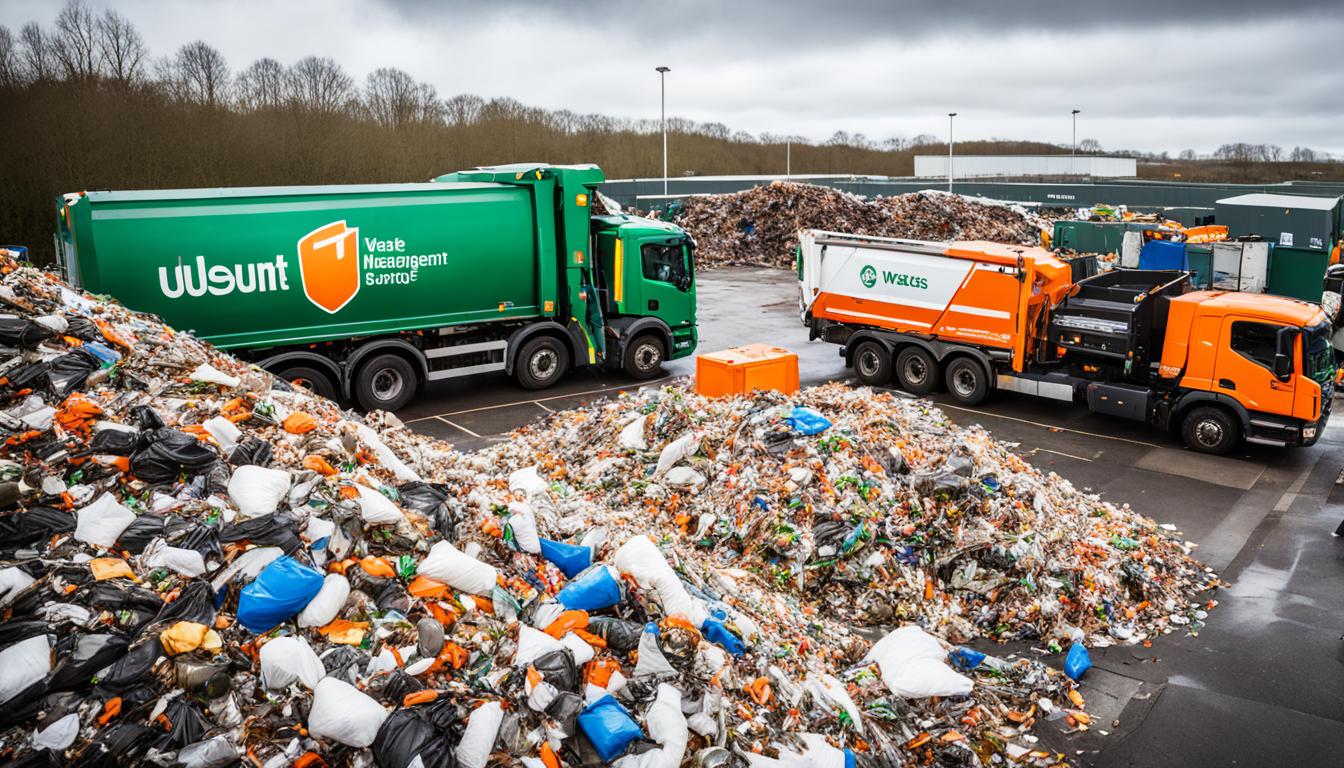Are you interested in making a difference in the environment while also running a successful business? Starting a waste management company in the UK is a promising venture that allows you to contribute to sustainability efforts and meet the increasing demand for waste management services. This guide will provide you with expert insights on how to set up a waste management company, navigate the rules and regulations, and estimate the costs involved.
Before diving into the details, let’s explore what a waste and recycling business entails.
What is a Waste and Recycling Business?
A waste and recycling business plays a crucial role in collecting and managing waste materials in an environmentally sustainable way. With the increasing emphasis on sustainability and recycling in the United Kingdom, the demand for waste management services is growing rapidly. These businesses offer sustainable waste solutions and contribute to the reduction of waste that ends up in landfills. By implementing effective recycling practices, they help conserve resources and promote a greener future.
In the UK, waste management companies operate under the guidelines of the Waste Framework Directive and other relevant regulations. These regulations govern the handling, transportation, and proper disposal of waste to ensure that it is managed in a safe and environmentally responsible manner.

Effective waste and recycling businesses establish recycling facilities across the UK to support the processing and transformation of waste materials into reusable products. These facilities utilize innovative technologies and processes to maximize the recycling potential and minimize the negative impact on the environment. By investing in modern recycling infrastructure, waste management companies can offer efficient and sustainable waste management solutions to their clients.
“A waste and recycling business is at the forefront of promoting sustainable waste solutions in the United Kingdom. By adopting environmentally friendly practices and investing in state-of-the-art recycling facilities, these businesses are driving the transition towards a circular economy.”
Sustainable Waste Solutions
A waste and recycling business focuses on providing sustainable waste solutions to meet the growing environmental concerns and regulations. They aim to reduce waste generation, increase recycling rates, and minimize the impact on natural resources. Through efficient waste collection, sorting, and processing, these businesses strive to optimize resource recovery and minimize the amount of waste that goes to landfills.
Their sustainable waste solutions include:
- Comprehensive waste collection services for different types of waste materials.
- Implementing waste segregation practices to facilitate recycling.
- Utilizing advanced technologies for efficient waste sorting and processing.
- Partnering with recycling facilities to ensure maximum resource recovery.
- Offering tailored waste management solutions for businesses, organizations, and individuals.
The Importance of Recycling Facilities in the UK
Recycling facilities in the UK are vital for the effective management of waste materials. They serve as key components of the waste and recycling infrastructure, providing the necessary infrastructure and processes to transform various types of waste into valuable resources. These facilities employ advanced technologies and employ skilled personnel to ensure optimal waste processing and recovery.
By collaborating with recycling facilities, waste management companies can enhance their recycling capabilities and offer comprehensive waste management services to their clients. Recycling facilities enable the recovery of raw materials from waste, reducing the need for extraction of virgin resources and helping to conserve the planet’s natural resources.
| Type of Waste | Recycling Process |
|---|---|
| Paper and Cardboard | Pulping, deinking, and reprocessing into new paper products. |
| Plastic | Sorting by type, shredding, melting, and re-pelletizing into new plastic products. |
| Metal | Sorting, shredding, melting, and refining for use in manufacturing various metal products. |
| Electronic Waste | Disassembling, segregating components, and recycling valuable materials. |
| Wood | Grinding, chipping, and repurposing for various applications like composite boards or biomass fuel. |
| Glass | Cleaning, crushing, and remelting for the production of new glass products. |
| Clothing | Sorting, cleaning, and repurposing for resale or recycling into new textiles. |
| Construction Waste | Sorting, crushing, and repurposing for use in construction materials or road aggregates. |
Who is a Waste and Recycling Business Suited to?
A waste and recycling business is well-suited to various customers, including businesses, organizations, and individuals. With a growing emphasis on sustainability and eco-friendly waste management, there is an increasing demand for waste solutions that prioritize recycling and responsible waste disposal. Waste and recycling companies have the opportunity to cater to specialized needs, such as collecting difficult-to-recycle materials and providing tailored services for specific waste requirements.
One of the key factors for success in the waste and recycling industry is the ability to stand out in the market. To achieve this, companies must prioritize excellent service and innovation. By offering exceptional customer experiences and pioneering new waste management solutions, businesses can differentiate themselves and attract a loyal customer base.
Specialized Waste Solutions
Waste and recycling businesses can offer specialized waste solutions tailored to specific industries or waste types. For example:
- Developing recycling programs for businesses in the hospitality sector to manage food waste effectively
- Collecting and processing electronic waste for technology companies
- Providing construction waste management services for contractors and builders
By catering to these specialized needs, waste and recycling companies can position themselves as experts in their respective fields and gain a competitive edge in the industry.
Innovation and Sustainable Practices
Innovation plays a crucial role in the waste and recycling industry. Companies that embrace technological advancements and implement eco-friendly waste management practices can set themselves apart from competitors.
At Green Solutions Waste Management, we have invested in state-of-the-art sorting and processing technology, allowing us to achieve higher recycling rates and minimize waste sent to landfill. Our commitment to innovation sets us apart in the industry and ensures we provide sustainable waste solutions for our customers.
Additionally, waste and recycling businesses can explore partnerships and collaborations with research institutions and environmental organizations to develop new approaches and technologies for waste management.

The image above showcases the importance of eco-friendly waste management in preserving our environment.
Rules and Regulations for Waste Management Companies
Starting a waste management company in the UK comes with a range of rules and regulations that must be followed to ensure legal compliance. These regulations cover various aspects of waste management, including waste legislation, planning consent, waste transportation, and health and safety requirements.
One of the key regulations that waste management companies must adhere to is waste legislation. This legislation outlines the proper handling, storage, and disposal of different types of waste. It is crucial for companies to understand and follow these guidelines to avoid penalties and ensure the environmentally responsible management of waste.
Another important aspect of waste management regulations is obtaining planning consent. This involves acquiring the necessary permissions and permits from local authorities to operate a waste management facility or establish waste collection points. Planning consent ensures that waste management activities are conducted in suitable locations and do not adversely impact the surrounding environment or communities.
Additionally, waste transportation regulations dictate how waste should be transported from collection points to disposal or recycling facilities. These regulations ensure that waste is transported safely and securely, minimizing the risk of spillage or contamination during transit. Waste management companies must comply with these regulations to ensure the proper handling and transportation of waste materials.
Health and safety requirements are also a critical aspect of waste management regulations. Companies must prioritize the safety of their employees and the general public by implementing measures to prevent accidents, injuries, and the spread of hazardous substances. This includes providing appropriate personal protective equipment (PPE), conducting regular training sessions, and maintaining a safe working environment.
To navigate the complex landscape of waste management regulations, it is advisable for companies to work closely with relevant government agencies such as the Department for Environment, Food and Rural Affairs (DEFRA) and the Environment Agency. These agencies can provide guidance and support in understanding and meeting regulatory requirements, including waste disposal licenses and waste collection permits.
Key Waste Management Regulations:
| Regulation | Description |
|---|---|
| Waste Legislation | Guidelines for the proper handling, storage, and disposal of waste materials. |
| Planning Consent | Permissions and permits required to operate a waste management facility or establish waste collection points. |
| Waste Transportation Regulations | Rules for the safe and secure transportation of waste from collection points to disposal or recycling facilities. |
| Health and Safety Requirements | Measures to ensure the safety of employees and the general public during waste management operations. |
By complying with waste management regulations, companies can not only avoid legal issues but also contribute to the sustainable management of waste in the UK. It is essential to stay updated on any changes or updates to regulations and seek professional advice when necessary to ensure ongoing compliance.

How Much Does it Cost to Start a Waste Management Company?
The cost of starting a waste management company can vary depending on factors such as the size of the operation, the types of waste handled, and the required equipment and facilities. Start-up costs may include purchasing or renting a suitable property, acquiring vehicles and machinery, obtaining permits and licenses, and covering insurance and registration fees. A detailed budget and financial plan should be prepared to assess the initial investment needed.
When starting a waste management company, one of the most crucial considerations is the initial investment required. The costs involved can be significant and must be carefully budgeted for to ensure the smooth running of the business.
Property: One of the major expenses is purchasing or leasing a suitable property for waste management operations. The location and size of the property will impact the overall cost.
Vehicles and Machinery: Waste management companies require a fleet of vehicles, such as trucks or vans, for waste collection and transportation. Additionally, specialized machinery and equipment may be needed for waste sorting, processing, and disposal.
Permits and Licenses: It is essential to obtain the necessary permits and licenses to legally operate a waste management company. The cost of these permits and licenses will vary depending on the location and the types of waste to be handled.
Insurance and Registration Fees: Waste management companies must have appropriate insurance coverage to protect against any potential risks or liabilities. There may be registration fees associated with registering the business and obtaining relevant certifications.
Creating a detailed budget and financial plan is essential to estimate the start-up costs accurately. It helps to consider ongoing expenses such as employee wages, maintenance costs, disposal fees, and marketing expenses. Seeking advice from industry experts and consulting with waste management professionals can provide valuable insights and assistance in estimating start-up costs.
Example Budget for Starting a Waste Management Company:
| Expense Category | Estimated Cost (£) |
|---|---|
| Property Purchase or Lease | 250,000 – 1,000,000 |
| Vehicles and Machinery | 150,000 – 500,000 |
| Permits and Licenses | 10,000 – 50,000 |
| Insurance and Registration Fees | 5,000 – 25,000 |
| Initial Inventory and Supplies | 20,000 – 50,000 |
| Marketing and Promotion | 10,000 – 30,000 |
| Contingency Fund | 50,000 – 100,000 |
| Total Start-Up Costs | 495,000 – 1,755,000 |
Note: The above figures are estimated costs and may vary based on location, business size, and other specific requirements. It is advisable to consult with financial professionals and conduct thorough market research to determine accurate start-up costs for your waste management company.
Starting a waste management company requires careful planning and consideration of the associated costs. By conducting thorough research, creating a detailed budget, and seeking expert advice, aspiring entrepreneurs can make informed decisions and set up a waste management business successfully.
Tips and Advice for a Waste Disposal Business
Running a successful waste disposal business requires a focus on excellent service and meeting customer needs. By offering convenient waste collection and recycling services, exploring niche markets, and providing innovative solutions, you can differentiate your waste disposal business from competitors.
Building relationships with customers is crucial for success in the waste disposal industry. By providing reliable and efficient waste collection and disposal services, you can establish trust and loyalty with your clients. This can lead to repeat business and positive word-of-mouth recommendations.
Staying up to date with industry trends and technologies is also essential in a waste disposal business. The waste management sector is constantly evolving, with new regulations and advancements in recycling practices. By keeping abreast of these changes, you can ensure compliance and offer the most efficient and sustainable waste solutions.
“Innovation is key in the waste disposal industry. Be open to new ideas and technologies that can improve your operations and enhance your waste recycling services.”
“Offering convenient waste collection and recycling services, exploring niche markets, and providing innovative solutions can help differentiate a waste disposal business from competitors.”
Moreover, it is crucial to focus on proper waste handling and disposal. This includes following all applicable regulations and obtaining the necessary permits and licenses. By ensuring that waste is disposed of in an environmentally responsible manner, you can build a reputation as an eco-friendly waste disposal service provider.
To summarize, running a successful waste disposal business requires a combination of excellent service, innovation, and adherence to regulations. By providing convenient waste collection and recycling services, building strong customer relationships, and staying informed about industry trends, you can establish your business as a trusted and environmentally conscious waste management service provider.
| Key Tips for a Waste Disposal Business |
|---|
| Offer convenient waste collection and recycling services |
| Explore niche markets to find unique opportunities |
| Provide innovative waste disposal solutions |
| Build relationships with customers for repeat business |
| Stay up to date with industry trends and technologies |
| Ensure proper waste handling and disposal |
Different Kinds of Waste Recycling
In order to promote sustainability and reduce waste sent to landfills, waste recycling encompasses various materials. Each type of waste recycling presents unique opportunities and challenges to create a more environmentally friendly future.
Paper and Cardboard Recycling
Paper and cardboard recycling is one of the most common forms of waste recycling. By collecting and processing used paper and cardboard materials, recycling facilities transform them into new paper products, reducing the demand for new raw materials. This process helps conserve trees and energy and reduces water consumption in paper production.
Plastic Recycling
Plastic recycling is crucial for minimizing plastic waste and its negative impact on the environment. Recycling facilities collect plastic materials, sort them into different categories, and convert them into new products. This process not only reduces the amount of plastic waste in landfills but also helps conserve resources such as oil and energy needed for plastic production.
Metal Recycling
Metal recycling is an efficient way to repurpose various metallic materials, including aluminum, steel, and copper. Recycling these metals helps conserve natural resources, reduce greenhouse gas emissions, and minimize the need for extracting raw materials. Recycling facilities melt down the collected metal, purify it, and transform it into new products.
Electronic Waste Recycling
With the rapid advancement of technology, electronic waste recycling has become increasingly important. Recycling facilities specialize in dismantling and processing electronic devices to recover valuable components and materials. This ensures that hazardous substances, such as lead and mercury, found in electronic waste, are properly disposed of, preventing environmental contamination.
Wood Recycling
Wood recycling involves processing used or waste wood into new products or fuel sources. Recycling facilities collect and sort waste wood, ensuring that it is free from contaminants such as paint or chemicals. The processed wood can be used in manufacturing new furniture, construction materials, or as a renewable energy source.
Glass Recycling
Glass recycling involves sorting and processing used glass bottles, jars, and other glass products. Recycling facilities collect the glass, remove any non-glass materials, and crush it into small particles. These particles, called cullet, are then melted and used to create new glass products. Glass recycling helps conserve energy, reduce landfill waste, and lower carbon emissions.
Clothing Recycling
Clothing recycling aims to reduce textile waste and promote a circular economy. Recycling facilities collect used clothing and textiles, which are then sorted, cleaned, and processed. The recovered materials can be repurposed into new garments, accessories, or used as industrial rags. Clothing recycling helps decrease the environmental impact of fast fashion and extends the lifecycle of textiles.
Construction Waste Recycling
Construction waste recycling focuses on the reuse and recycling of materials generated during construction and demolition activities. Recycling facilities collect materials such as concrete, wood, metal, and asphalt, and process them into new products. Construction waste recycling helps conserve natural resources, reduce landfill waste, and minimize the environmental impact of the construction industry.
Recycling facilities play a crucial role in processing and transforming various waste materials into usable products. Their efforts significantly contribute to a more sustainable future by reducing waste, conserving resources, and minimizing environmental impact.
| Material | Recycling Process | Benefits |
|---|---|---|
| Paper and Cardboard | Collection, sorting, pulping, and reformation | Conserves trees, reduces energy and water consumption |
| Plastic | Collection, sorting, shredding, melting, and reforming | Minimizes plastic waste, conserves resources |
| Metal | Collection, sorting, melting, purification, and reforming | Conserves natural resources, reduces emissions |
| Electronic Waste | Dismantling, recycling of valuable components, proper disposal of hazardous materials | Prevents environmental contamination |
| Wood | Collection, sorting, processing into new products or energy sources | Repurposes waste wood, reduces deforestation |
| Glass | Collection, sorting, crushing, melting, and reforming | Conserves energy, reduces landfill waste and carbon emissions |
| Clothing | Collection, sorting, cleaning, and repurposing | Reduces textile waste, promotes circular economy |
| Construction Waste | Collection, sorting, and processing into new products or aggregates | Conserves resources, reduces landfill waste |
Conclusion
Starting a waste management company in the UK presents a unique opportunity to contribute to environmental sustainability while also building a profitable business. By understanding the rules and regulations governing waste management, identifying niche markets, and providing innovative waste solutions, entrepreneurs can thrive in this growing industry.
With the increasing emphasis on sustainable waste solutions and recycling in the UK, there is a high demand for waste disposal services. By offering comprehensive waste management services, including collection, disposal, and recycling, businesses can meet this demand and establish a strong presence in the market.
It is important for waste management companies to prioritize sustainability in their operations. By investing in recycling facilities and adopting sustainable practices, businesses can ensure the proper management of waste materials, reduce the amount of waste sent to landfills, and contribute to a greener future.
As the UK continues to prioritize environmental sustainability and waste management, the demand for waste disposal services is expected to rise. Entrepreneurs who establish a waste management company now can position themselves for long-term success in this dynamic industry.
FAQ
Who is a waste and recycling business suited to?
A waste and recycling business is suited to entrepreneurs who are passionate about environmental sustainability and want to contribute to waste management. It is ideal for those interested in providing eco-friendly waste solutions and recycling services to commercial and residential customers.
What are the rules and regulations for waste management companies?
Waste management companies in the UK must comply with waste legislation, planning consent requirements, waste transportation regulations, and health and safety standards. It is important to work closely with regulatory bodies such as the Department for Environment, Food and Rural Affairs and the Environment Agency to ensure legal compliance.
What are some tips and advice for a waste disposal business?
To run a successful waste disposal business, it is important to focus on excellent service, meeting customer needs, and innovation. Offering convenient waste collection and recycling services, exploring niche markets, and providing tailored waste solutions can help differentiate your business. Building strong relationships with customers, ensuring proper waste handling and disposal, and staying up to date with industry trends and technologies are also important factors for success.
What are different kinds of waste recycling?
Waste recycling encompasses various materials such as paper and cardboard, plastic, metal, electronic waste, wood, glass, clothing, and construction waste. Each type of waste recycling presents unique opportunities and challenges. Recycling facilities in the UK play a crucial role in processing and transforming waste materials into usable products.




